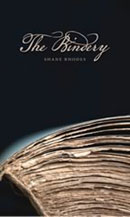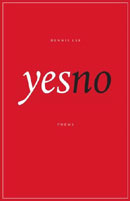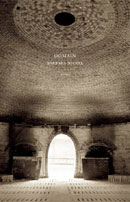DominionSections
Browse Articles
- IndependentMedia.ca
- MostlyWater.org
- Seven Oaks
- BASICS Newsletter
- Siafu
- Briarpatch Magazine
- The Leveller
- Groundwire
- Redwire Magazine
- Canadian Dimension
- CKDU News Collective
- Common Ground
- Shunpiking Magazine
- The Real News
- Our Times
- À babord !
- Blackfly Magazine
- Guerilla News Network
- The Other Side
- The Sunday Independent
- Vive le Canada
- Elements
- ACTivist Magazine
- The Tyee
- TML Daily
- New Socialist
- Relay (Socialist Project)
- Socialist Worker
- Socialist Action
- Rabble.ca
- Straight Goods
- Alternatives Journal
- This Magazine
- Dialogue Magazine
- Orato
- Rebel Youth
- NB Media Co-op
Radio
August Books
July 21, 2007
August Books
New works by Rhodes, Lebowitz, Henderson, and Nickel

The Bindery
Shane Rhodes
NeWest Press: Edmonton, 2007.
This third collection by Shane Rhodes is a declaration, a questioning, a conversation, and a language lesson, all rendered in the strong and unrelenting voice he established in his previous two books. The range of form is impressive: compare the contemplative open field style of “Portrait,” which examines memory and myth through the recollection of family figures and the national history of oppressive deceit, to the prose poems chronicling travels in Mexico, which celebrate foreign culture as seen through the eyes of the traveller. Compare again to the list poems “On Travel” and “To Elizabeth Bishop.” In each case, Rhodes marries form and content seamlessly. The eponymous “The Bindery”-- alternately funny, moving, and smart, this is Rhodes at his best-- uses original verse and found items (overheard snippets of conversation, literary quotations, signage, photographs) to create a constellation of images and moments. It's the poet who ‘binds’ all the pieces together – both in “The Bindery” as a poem and The Bindery as a collection – thus allowing for dialogue between the individual elements, the infusion of meaning, and a powerful overall effect.
--Matthew J. Trafford

Hannus
Rachel Lebowitz
Pedlar Press, 2007.
Lebowitz's first book is a creative biography of her great-grandmother, suffragist Ida Hannus, who moved to a Finnish socialist commune on the BC coast in 1901. The questions "what happened?" and "what was it like?" are answered from a range of documented and imagined perspectives. These voices blur, sometimes to the point of confusion. Hannus' mixed form includes photos, newspaper clippings, diary excerpts, interview quotations, Finnish literature, and government documents, into which
Lebowitz inserts poetic and prose commentary. The resulting collage is questioning, tender, and surprisingly reluctant to present or imagine its characters' personalities. One of the most effective poems is the simple "Grocery Shopping." It describes how "he launched the craft / pushed the boat into the waves . . . / We waited. / He returned with a lap organ. / 'But music,' he said, 'feeds our souls.'” The poem exemplifies Lebowitz' commitment to incorporating external sources, taking its first verse from a Finnish folk poem. Also, its eloquent placement after a section on suffering in the commune allows its unnamed characters both to represent the community, and to imply the developing relationship between Hannus and her partner. It's these compelling personal tensions which seem to be lacking in the work as a whole.
--Jane Henderson

yesno
Dennis Lee
Anansi: Toronto, 2007.
In yesno, Dennis Lee returns to the theme he considered in Un: the future of planet earth. These poems examine how the simultaneous forces of hope and pessimism interact to create an ethic that Lee sums up as "yesno." This is a new kind of eco-poetry. It rebukes and encourages in the same breath. In "dopey," Lee even issues a call to arms: "Dopey & grumpy & doc, just / truckin along – / here come chorale; / mind to the / grindstone, ear to the plough. / Hi- / hoein along with a song: / What home but here? Whose grubby hands but ours?" These poems, however serious in intent, are playful. Lee pairs words in nonsensical ways. He pays strange and wonderful attention to rhythm. In "forgi-", a poem about unforgivable acts, Lee scats, "blindblabbing our / gobshut, our / gutted-by-greenslag, our undisad- / missable burden". In "DNA", Lee writes, "No DNA for the crunch, we got / neural nothing. / No yesno receptors; no template for cosmochaos." In yesno, Lee seems intent on creating just that—a template. A means, as he writes in the title poem, to "habitate crossbeing. / To ride both reals at once."
--Ben Hart

Domain
Barbara Nickel
Anansi: Toronto, 2007.
Nickel has the ear of a violinist as well as a poet, and there is a trained lightness to her sense of the line and the phrase. Nickel uses parts of a house-- “Master Bedroom,” “Girls' Room,” “Living Room,” etc—as her section headings, and the most surprising and satisfying of her formal tricks is to begin each of these sections with a poem whose first line repeats the last line of the previous section's initial poem. These linked verses feel like generations of a family, each borrowing a starting point and then veering off somewhere new. The section on Catherine the Great contains the fierce and dreamy poem, “Woman on a White Horse,” in which the empress is a presence in a small Saskatchewan town: “She came from a blue half-light./ She was snow spun high off a drift/ by the wind, woman on a white horse/ on my way to school—there!--/ see her hair, sabre, a glitter in the air/cast orange by the lights of the arena.” The warlike figure of Catherine saves the collection from running too close to sentimentality in its domestic scope, and Nickel's precision does the rest.
--Linda Besner
Related articles:
By the same author:
Comments
Archived Site
The Dominion is a monthly paper published by an incipient network of independent journalists in Canada. It aims to provide accurate, critical coverage that is accountable to its readers and the subjects it tackles. Taking its name from Canada's official status as both a colony and a colonial force, the Dominion examines politics, culture and daily life with a view to understanding the exercise of power.